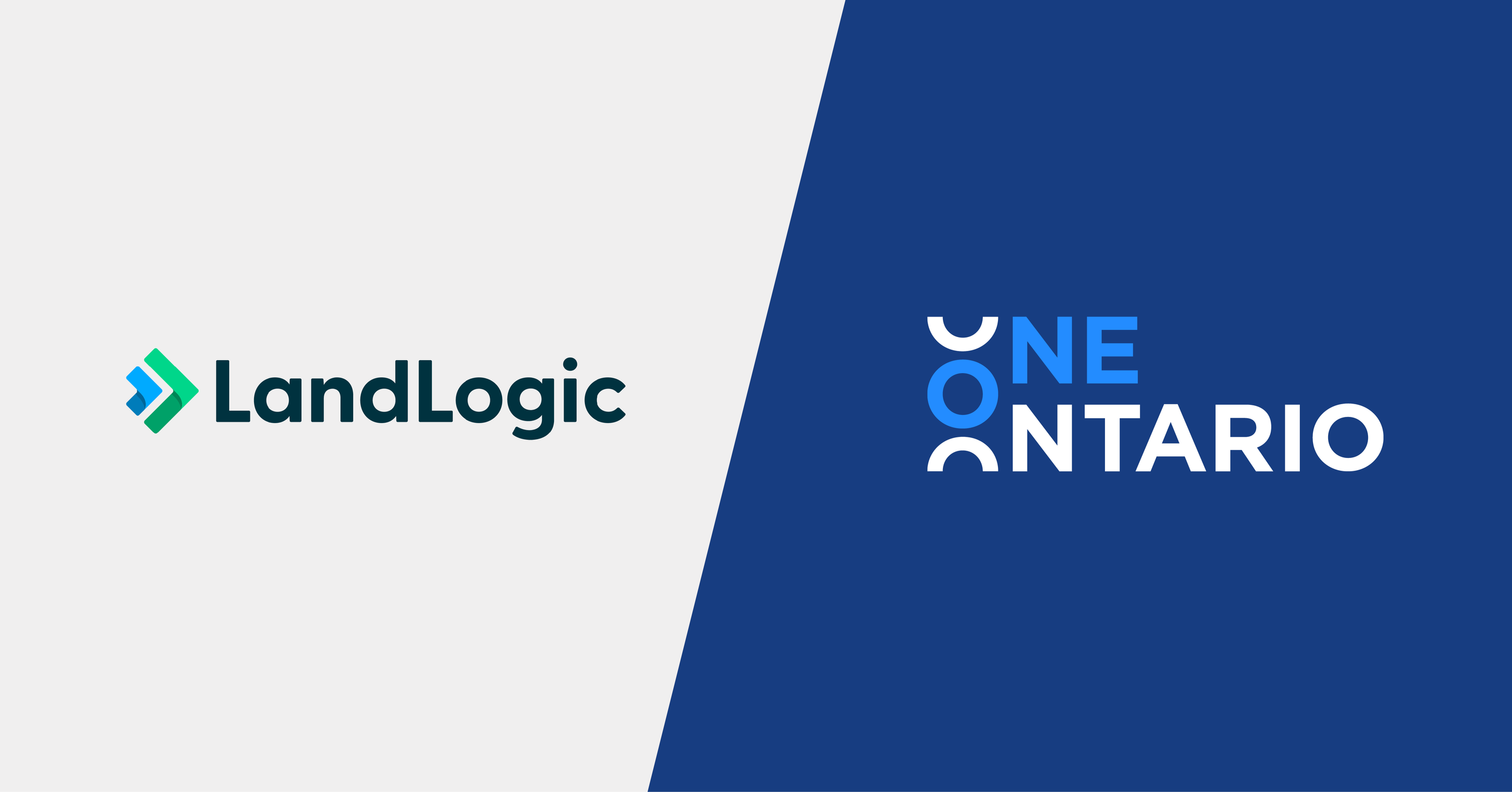LandLogic is now powering One Ontario
LandLogic is thrilled to announce that it is now powering the One Ontario solution to streamline the development approvals process. LandLogic plays a pivotal role by structuring and harmonizing land data, providing jurisdictional clarity for developers while supporting authorities in making good development decisions.
The One Ontario solution
Started as a research project in 2020, One Ontario is now operating as a non-profit organization dedicated to improving data exchange to streamline development approvals and help address the housing crisis. It acts as a vendor-neutral collaboration layer, streamlining communication between applicants and regulatory agencies.

Solving development approval challenges for industry and government
The real estate and development industry is inundated with data from many sources including municipalities, conservation authorities and various other agencies and authorities having jurisdiction. While there is a wealth of information, data fragmentation leads to a significant drain on resources due to the considerable time and effort required to gather and interpret applicable data for any given project.
Not only does this hinder project progression, but it also escalates costs and complicates compliance with ever-changing regulations. For example, working through the complex array of zoning bylaws, environmental constraints and overlapping governmental regulations, a developer embarking on new projects will struggle to identify which regulatory bodies have authority. Working through the maze is expensive, risky and time-consuming, ultimately slowing down the development of much-needed housing.
━━
“I'm very glad to have LandLogic as part of the One Ontario solution because it will help address the challenges that both government and industry have been struggling with related to siloed data.”
- Hugh O’Reilly, Chairman of the Board of One Ontario
The challenge is evident across the construction industry, and the impact easily illustrated by the current housing crisis in Canada. Housing starts currently sit at approximately 225,000 per year, but the government has set an ambitious goal of adding up to 3.87 million new homes by 2031. The C.D. Howe Institute estimates homebuyers paid an extra $168,000 on an average new home in part due to Canada’s lengthy approval processes. This underscores the urgent need for faster construction processes and more effective land use planning.
Under pressure to meet housing and development targets and service constituents, municipal, provincial and federal government entities involved in regulatory oversight around land development policies, inquiries and applications face similar data challenges.
“Data exchange is at the heart of the housing affordability problem,” said Hugh O’Reilly, Chaiman of the Board of One Ontario. “I'm very glad to have LandLogic as part of the One Ontario solution because it will help address the challenges that both government and industry have been struggling with related to siloed data.”
“LandLogic consolidates diverse data sources including zoning laws, environmental, heritage and other constraints as well as market trends into a single platform,” said Arash Shahi, CEO of LandLogic. “This eliminates time-consuming navigation of fragmented information and provides data in a standardized format tailored to the requirements of a given municipality. By simplifying analysis and selection processes, and making it easier to understand regulatory expectations, the likelihood of delays and financial setbacks are decreased.’
A solution ready to implement
Following a successful pilot project, the One Ontario solution – now powered by LandLogic – is ready to be harnessed. Municipal, provincial and federal governments can all benefit from One Ontario’s streamlined development approval process, improved data exchange and sustainable process. One Ontario invites interested jurisdictions to contact them and become one of the leaders forging the future of land development in Canada.
RESCON NEWSLETTER: In 2025, artificial intelligence crossed a real tipping point in residential construction. What was once viewed as a futuristic concept became a daily operational tool across site selection, feasibility, and early project planning. Looking ahead to 2026, the firms that succeed will be those that embed AI into everyday thinking, not as a shortcut, but as a smarter way to build.
In 2025, LandLogic advanced property intelligence by standardizing fragmented data across Canada. With expanded coverage across 82 municipalities, upcoming entry into British Columbia, new partnerships, and major product launches, LandLogic strengthened its position at the center of the property intelligence landscape. Looking ahead to 2026, our focus remains on removing friction from property research and due diligence so land-use decisions can move faster and with greater confidence.
During our recent webinar with Teranet on the Basic Zoning Report in GeoWarehouse, realtors and property professionals asked insightful questions about zoning accuracy, updates, commercial uses, and more. We’ve summarized the top questions here so you can quickly understand how zoning intelligence supports better research, marketing, and decision-making.
RESCON NEWSLETTER: Ontario’s multiplex and ADU policies opened the door, but scattered bylaws, unclear eligibility, and slow permitting still stall projects. The article shows how AI can create clear answers, quickly flag eligible lots, and reduce errors early in the process. With modern, AI-enabled workflows, multiplex and ADU projects can move far faster, making gentle density more achievable across the province.
RESCON NEWSLETTER: Canada’s “Buy Canadian” mandate must include digital infrastructure — not just materials. Relying on foreign systems weakens digital sovereignty and coordination in housing data. He calls for investing in Canadian-built, AI-ready platforms like LandLogic to unify zoning, planning, and valuation data. Building “digital land,” is key to building Canada’s future.
PODCAST: This episode explores how intelligent data is transforming real estate. It looks at how turning static zoning and planning records into live, connected intelligence is reshaping how professionals assess sites, speed up approvals, and unlock development potential. The discussion highlights why AI-ready infrastructure is becoming essential to Canada’s property market.
RESCON NEWSLETTER: Canada’s housing crisis isn’t just about supply—it’s about data. In this piece, LandLogic CEO Arash Shahi reveals how fragmented, outdated zoning information is slowing development, driving up costs, and blocking AI-driven innovation. He argues that building an AI-ready property data infrastructure is key to unlocking faster approvals, smarter planning, and real progress on housing supply.
The new collaboration between LandLogic and Teranet is a game-changer. LandLogic’s Basic Zoning Report is providing real estate professionals across Ontario with instant access to critical zoning data. This powerful new capability transforms the due diligence process, offering an efficient and timely way to uncover a property’s highest and best use. Let’s take a closer look at how various professionals can harness this enhanced intelligence to drive success.
We are proud to welcome Hugh O’Reilly as the new Chair of LandLogic’s Board of Directors. A visionary leader with a proven track record in governance, strategy, and innovation, Mr. O’Reilly brings a depth of expertise that will be instrumental in shaping LandLogic’s next chapter.
LandLogic Solutions Inc. is proud to announce a strategic partnership with Teranet Inc., Ontario’s exclusive provider of land registry data and a trusted steward of property intelligence. Together, we are launching a new capability: instant zoning intelligence, embedded directly into GeoWarehouse, a platform used by real estate and land professionals across Ontario.
CMHC’s Housing Design Catalogue is a promising step toward faster, more affordable housing development. But even with pre-approved designs, projects can stall due to zoning restrictions, infrastructure constraints, and regulatory complexity. LandLogic bridges this gap by consolidating critical data; helping developers and municipalities identify build-ready sites in minutes, not weeks.
Residential Multiplex Infill (RMI) streamlines multi-unit development by identifying properties that align with zoning and funding opportunities like CMHC’s MLI Select. LandLogic simplifies this process with data-driven tools for zoning analysis, site selection, and ROI optimization—empowering real estate professionals to make smarter, faster decisions.
2024 has been a year of significant progress for LandLogic as we worked to equip the real estate industry with meaningful tools. This year, we launched innovative solutions that help identify ideal sites, assess property values, and evaluate risks and opportunities—providing the insights needed to streamline real estate projects.
Imagine you’re Drake, one of the world’s biggest stars. You have everything—fame, fortune and a dream home that you had custom built in Toronto’s prestigious Bridle Path neighborhood. But then a massive storm hits, and your mansion suffers significant flood damage. What went wrong?
Ontario faces significant obstacles in meeting housing supply goals, from lengthy development approval processes to fragmented data management, not to mention inflation, mortgage rates, and skilled trades shortages – both on the regulatory side and the industry side. One Ontario - powered by LandLogic - is ready to help on the data and process side, one of the biggest bottlenecks in getting projects approved.
LandLogic is thrilled to announce that it is now powering the One Ontario solution to streamline the development approvals process. LandLogic plays a pivotal role by structuring and harmonizing land data, providing jurisdictional clarity for developers while supporting authorities in making good development decisions.
By providing a comprehensive, automated review of potential sites, AI can help in selecting the most viable options, helping the developer optimize investments and mitigate risks.
Coming soon! The introduction of Zoning Reports to our platform will enhance the ability of our users to make strategic decisions and succeed in a competitive market. Stay tuned for the release and prepare to take your real estate ventures to the next level with LandLogic.
While the budget trends in the right direction for housing, real success hinges on aggressively cutting through bureaucratic red tape and accelerating approval processes. The government must transition from talk to tangible action, focusing sharply on execution.
A recent Bloomberg article pointed out that in 2013, Canada was 13th among 170 nations in meeting basic citizen needs, per the Social Progress Imperative. By 2023, it fell to 39th, significantly due to the housing affordability crisis and reduced productivity, paralleled by a decline in well-being.
As Canada grapples with a housing shortage of 3.5 to 5 million homes, the question arises: could the ambitious architectural mega-projects coming out of the Middle East offer an example for solving Canada’s housing crisis?
By operating as guerilla-like proof-of-concepts, these urban “experiments” can lead to tangible improvements and even potential policy shifts.
There is a pressing need for a balanced approach that respects community concerns while also advancing broader housing goals. This is where technology and data analytics should come into play.
AI for predictive analysis and map-based data technologies to provide additional insights can democratize data access, streamline development processes, and foster better collaboration between developers and regulators.
The disconnect between available land versus developable land requires a strategic, collaborative approach if we are going to transform raw land into vibrant communities.
Being aware of a property's flood plain status or other environmental constraints not only impacts the feasibility of development plans but could also provide significant negotiating leverage.
With LandLogic our goal is to help construction leaders transform greenfield and brownfield sites into thriving communities, respecting the past and embracing the future.
The LandLogic team has dedicated decades to researching the challenges of urban development, focusing on streamlining the development process.
The AECO team has been incubating LandLogic over the past year, and the platform is now ready for beta testing.





























